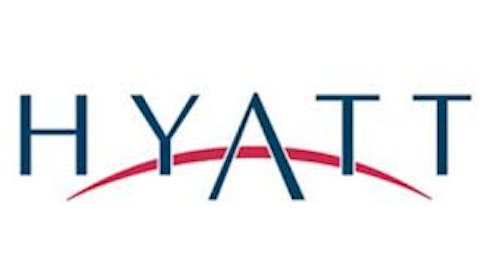The lodging industry took a huge blow with the last world economic recession. Some went under, others managed to stay alive. For those who remained in the game, recovery was not easy. Marriott International Inc (NYSE:MAR), Wyndham Worldwide Corporation (NYSE:WYN), and InterContinental Hotels Group PLC (ADR) (NYSE:IHG)are three companies that were able to stay at the table. Today, all three hold good future prospects, although some are better than others.

Do you speak Chinese?
Economic cycles offer opportunities when at their lowest. Intercontinental is quickly reaching that point. The company is No. 1 in the U.S. hotel operation business, and has been present for more than a decade in China. As the world economy continues to grow, the firm will see revenue increments become ever larger.
InterContinental Hotels Group PLC (ADR) (NYSE:IHG) has created for itself a significant economic moat through its franchise business model. The effectiveness of the model has reflected upon higher return on invested capital and franchising reaching nearly the 100% mark. In addition, franchises are leased for 10 to 30 years, rooms are expected to continue growing by 3% annually, and brand-switching costs are quite high; in few words, the model is far from being exhausted. Revenue increments since 2009 can attest the firm’s successful path.
In comparison with competitors, InterContinental Hotels Group PLC (ADR) (NYSE:IHG) has made big fuss about entering Europe. However, the firm has concentrated its efforts on establishing a solid position within China. Having entered the Asian market in 1984, the company holds an important edge over competition. Since only 20% of the hotels are branded in China, there is plenty of room for expansion – and for the company to put its know-how to work.
Back in the U.S., InterContinental Hotels Group PLC (ADR) (NYSE:IHG) also holds more and better-known branded hotels than is competition. Already possessing an economic moat and holding the best infrastructure, coupled with economic recovery, the firm offers the best growth prospects in the industry. There is little to wonder then, if the company’s indicators stand above industry averages, as they do now.
In the end, Intercontinental is the industry’s best-positioned firm to reap the benefits of economic recovery. On the down side, the company has not paid much attention to shareholders. And, even if more attention can be paid to them, the results have been above average. So, I would recommend buying this stock, not because it is shareholder-friendly, but because performance has been very good. Trading at 15.1 times its earnings, about a 36% discount to the industry average valuation, this sure looks like a value stock.
Bye bye timeshare, welcome
With the U.S. economy steadily returning to normal, hotel reservations will see an increase in activity. Marriott will benefit specifically, because it is the second largest hotel operator in the U.S. The argument is pretty simple: Marriott’s big dependency on U.S. economic performance will continue to strongly affect the company’s results, for bad and good. Let us look at other variables that may impact the firm’s future prospects.
Marriott International Inc (NYSE:MAR) does not hold a great capital liability thanks to its business model, inhibiting the creation of an important economic moat. On the flip side, the company has created a small economic moat based on hotel operators’ high switching costs. Also, the firm has modified the business model with respect to its timeshare business. Telling evidence of the successful approach can be found on the average return on invested capital for the last five years. So, creating an economic moat is important, but business models and management are as important for earnings to materialize.
Now that Marriott International Inc (NYSE:MAR) is recovering, will shareholders enjoy the rewards too? I’d say they will; the company has a history of keeping investors happy, and management will prove it in the following three years; the firm is expected to allot $3 billion for the purpose. The question that remains is whether that kind of money will be available, given current debt levels. If history is worth anything, the company’s finances have been on the rise since the end of the recession.




